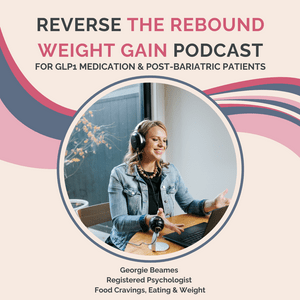Cravings and Childhood: Understanding the Root of Your Eating Behaviours
In this episode, we explore the complex relationship between our inner child, adult self, and how they influence our eating behaviors. We delve into the psychological concept that we are a sum of many parts, each playing a distinct role in how we navigate life, emotions, and food. The Concept of Multiple Parts Healthy Adult (Version 2): Represents our best self, living in the present moment, feeling empowered, connected, and calm. This part makes choices that support long-term well-being. Wounded Child Parts: These parts are stuck in the past, holding unprocessed trauma. They can feel unsafe and overwhelmed, even if the original events happened decades ago. Trauma and Its Impact Big T Trauma: Major traumatic events such as accidents or abuse. Little t Trauma: More subtle but repeated experiences like emotional neglect, critical parenting, or bullying. These experiences can significantly influence eating habits. Recognizing Who's in Charge When the Healthy Adult is in charge, thoughts are flexible and realistic, with a focus on progress over perfection. When a Wounded Child Part is in charge, thoughts become rigid and all-or-nothing, leading to behaviors like binge eating or numbing out with food. Eating Saboteurs Eating saboteurs act as protectors for our wounded child parts. Understanding these can help in shifting behaviors. The Rebel: Eats to defy control and societal expectations. The Distractor: Keeps busy to avoid emotions, leading to exhaustion and emotional eating. The Inner Critic: Uses food to relieve the pressure of self-judgment. The Numbing Out: Eats to escape stress, caretaking, or overwhelm. The Defeatist: Gives up, believing long-term change is impossible. The Avoider: Promises to start again tomorrow, perpetuating a cycle of overeating. Key Takeaways It is normal for wounded child parts to take over at times. Becoming aware of which part is driving behavior is the first step to change. Re-parenting the wounded child involves recognizing, validating, and soothing these parts. Shifting back to the healthy adult allows for more consistent, balanced behaviors. By tuning into which part is in charge, we can better manage our relationship with food and emotions. Through this process, we move away from blaming ourselves and towards understanding and compassion. Resources & Links: 🔗 Free Ebook > https://challenge.georgiebeames.com/ebook1728267248010 📩 Check out Client Case Studies > https://georgiebeames.clickfunnels.com/vsl1702964728509 📲 Follow on Socials: @georgiebeamespsychologist 💬 Enjoyed this episode? Share it with a friend and leave a ⭐⭐⭐⭐⭐ review!



